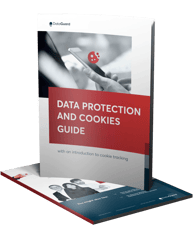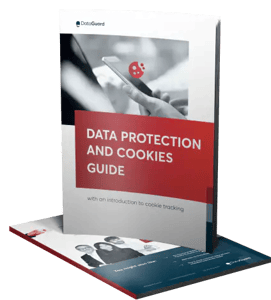In the information age, the value of data continues to grow. In particular, first-party data has emerged as a cornerstone of personalized marketing and deeper customer understanding.
But with great value comes greater risk. The quality and utility of the data relies on the ways you collect it and who you collect it from. And if your team wants to use it to improve marketing outcomes, they'll need to do so in strict accordance with data laws or they'll run the the risk of incurring severe penalties.
In this blog, we'll talk about the different types of data and compliant data collection. We'll explore some of the benefits and challenges surrounding first-party data. And we'll take a look at why third-party data is no longer enough for organizations in the world of Big Data.
What is first-party data?
In the age of Big Data, it's increasingly hard to draw the right conclusions from the right data. On top of that, the volume of data that companies face today just keeps getting bigger.
So it follows that companies with high data quality can gain a winning edge over the competition. And careful data analysis is really important if you want to make sure your company can enjoy that advantage (and maintain it).
In this context, there's a distinction between the different sources of data collection. Depending on where your company sources it's data, you might be collecting first-party data, second-party data or third-party data.
Why does that matter? It’s an important classification because it has a direct impact on the quality of the data as well as the data protection requirements on how the data in question may be processed.
What's the difference between first-party, second-party and third-party data?
First-party data refers to all data and information that companies collect directly from data subjects. In other words, it is the customer information that companies collect from their online and offline sources. The source of first-party data can be the company’s website, company apps, social media sites, media or surveys.
Examples of first-party data include:
- User demographics
- User website visits
- User interactions
- User interest profiles
- Time users spend on websites
And important distinction. First-party data is always collected free of charge. Also, users must have voluntarily provided their data and allowed your company to use it via a statement of consent.
Collecting first-part data compliantly
If you're unable to prove that a given user has consented to the free collection of their data by producing a corresponding statement of consent, this constitutes a data protection violation. According to the General Data Protection Regulation (GDPR), a violation of this kind can carry severe penalties.
Data protection violations can be penalised by fines of up to 18 million pounds or 4% of the violating company’s global annual turnover. Companies will incur whichever penalty bears the higher price tag. But even if an immediate fine can be avoided, companies who violate GDPR can be ordered to undergo regular inspections.
The data controller is responsible for the implementation of and compliance with data protection regulations; the data protection officer offers the data controller advice and support. Companies with 20 or more employees who process personal data are required to appoint a data protection officer.
The double opt-in method for first-party data
To secure the first-party data your company needs to succeed, we recommend using the double opt-in procedure, at least as far as your online activities are concerned. Double opt-in means that a confirmation email is sent to the user’s email address, which the user must then actively accept.
This process is the best way to ensure that the recipient of the email really consents to the collection and processing of their data. Although the GDPR does not clearly prescribe that companies use the double opt-in procedure for email marketing, there is a requirement that the data controller document user consent. At the same time, in a landmark 2019 decision the Austrian supervisory authority found that the absence of a double opt-in mechanism can constitute a breach of data protection law.
Second-party data
Second-party data is data that another company (Company B) collects directly from its target group. Another way of looking at it is that it’s basically Company B’s first-party data. To get second-party data, you’d need to cooperate with Company B. Also, Company B’s privacy policy must explicitly mention that it shares data with sales partners.
If users give their consent, there’s nothing stopping Company B from sharing second-party data. Second-party data therefore affords you the same advantages as does first-party data. You know exactly where the data comes from and how it was collected.
This allows you to customise your cooperation with Company B to your exact requirements. As such, acquiring data in this way is fundamentally different from trading in third-party data, where commercial data traders or data brokers sell data.
Third-party data
The business model of such data suppliers lies in collecting, aggregating and reselling mass amounts of data. If your company needs very specific company data or a large amount of data, third-party data can be a smart route to take. After all, the main advantage of third-party data is that it is available in large quantities and, above all, quickly.
The disadvantage of third-party data, however, is the lack of control. Since you don’t know when, how and by whom the third-party data was collected, it’s unfortunately very susceptible to errors. On top of that, you don’t have explicit user consent for the use of their data.
These two drawbacks mean you should approach buying personal data with caution. In any case, before purchasing third-party data, you should get detailed information about the rights of use and compatibility with data protection law. Here are 5 tools to audit your third-party cookies reliance.
5 benefits of compliantly using first-party data
First-party data is a valuable asset. If you use it correctly and compliantly, it can drive significant improvements in marketing effectiveness, customer satisfaction, and business outcomes. Here are a five ways it can help your company or your next campaign.
Enhanced personalization and customer experience
Unlock the power of personalization with first-party data to create experiences that resonate deeply with your customers. Tailor every touchpoint to reflect their preferences and behaviors, turning casual browsers into loyal enthusiasts.
Example: A skincare brand uses first-party data collected from their online quiz to recommend personalized skincare routines to their customers. By analyzing responses about skin types, concerns, and preferences, the brand sends customized product recommendations and care tips via email, significantly boosting customer satisfaction and repeat purchases.
Increased customer loyalty and retention
Build enduring relationships by showing your customers that you truly know and value them. Leverage first-party data to anticipate their needs and exceed their expectations, making your brand an irreplaceable part of their lives.
Example: A streaming service analyzes viewing habits and genre preferences from their first-party data to curate personalized playlists and show recommendations for each subscriber. This thoughtful curation keeps viewers engaged and less likely to cancel their subscriptions, as they continually discover new favorites.
Better ROI on marketing spend
Say goodbye to the spray-and-pray approach. With first-party data, you can hone your marketing efforts to target the right people with the right message at the right time, dramatically increasing your marketing efficiency and ROI.
Example: An e-commerce retailer uses purchase history and website behavior data to segment their audience for an email marketing campaign. They send targeted offers for products related to what the customers have bought or shown interest in, resulting in higher click-through rates and sales.
A competitive advantage with first-party data
In the race for relevance, first-party data can be a secret weapon. Use it to gain insights that keep you a step ahead of the competition, offering products, services, and experiences that truly meet your customers' needs.
Example: A fitness app uses workout and nutrition tracking data submitted by its users to identify emerging fitness trends. They quickly develop and launch new features and programs that cater to these interests, setting them apart from competitors and attracting a devoted user base.
Regulatory compliance and reduced risk
Turn compliance into a competitive edge. Show your customers that you're serious about protecting their data, and they'll reward you with their trust—and their business.
Example: A financial services company implements a transparent opt-in process for newsletters and financial advice based on users' financial interests and goals, explicitly detailing how the data will be used. This not only complies with data protection regulations but also reassures customers, fostering trust and encouraging more sign-ups.
By focusing on considerate data collection and privacy practices, marketing leaders can guide their teams to achieve outstanding marketing outcomes while building a foundation of trust with their customers.
Why third-party data is no longer enough
In a digital landscape where data drives decisions and personalization is essential, reliance on third-party data is increasingly insufficient for marketing teams aiming for relevance and impact.
The shift towards stricter data privacy regulations and growing consumer awareness around data privacy demands a more nuanced approach to data collection and usage.
Let’s explore the argument for expanding the types of data used by marketers and how a consent management platform (CMP) and comprehensive consent management strategy (CPM strategy) are pivotal to achieving this in a compliant, effective manner.
The limitations of third-party data
Decreasing reliability and access
With the advent of stringent privacy laws and the phasing out of third-party cookies, access to third-party data is dwindling. This data, often collected without direct user consent, is less reliable and increasingly viewed unfavorably by both regulators and consumers.
Quality and relevance issues
Third-party data is several steps away from the source, so it often lacks the depth and accuracy you need for highly personalized marketing efforts. Its generalized nature makes it difficult for your teams to create the kind of targeted, meaningful interactions that your customers and prospects expect.
The argument for expanding data types
First-party data for personalization and trust
Collecting data directly from your customers—with their consent—ensures high-quality, relevant insights that can drive personalized marketing strategies. This direct relationship also fosters trust, as consumers are more comfortable sharing data when they understand the value exchange and know their information is being used responsibly.
Zero-Party data for enhanced customer insights
Beyond first-party data, there's an increasing emphasis on zero-party data—information that consumers intentionally and proactively share. This can include preference data, purchase intentions, and personal context, offering a goldmine of insights for creating highly customized marketing campaigns.
The role of Consent Management Platforms and strategies
Building a foundation of compliance
A consent management platform enables your organization to collect, manage, and document user consent across your digital properties. This keeps you on top of compliance with regulations like GDPR and CCPA and can really help build a foundation of trust with customer and prospects.
Facilitating data strategy shifts
Implementing a CMP and developing a comprehensive CPM strategy allows for the ethical collection of first and zero-party data. By providing clear value propositions and ensuring transparency in data usage, companies can encourage users to share their data willingly.
Enabling personalization at scale
With a robust consent management strategy, marketers can leverage the rich insights from first and zero-party data to drive personalized marketing at scale. This approach enhances customer experiences and makes your marketing efforts more effective (and more compliant.
Why should your company prefer first-party data?
First-party data is the most valuable data in your possession. The financial outlay is manageable, since you collect the data free of charge. The greatest advantage, however, is that with first-party data, you possess the greatest possible degree of control as well as independence from third parties. After all, you collect the data yourself. At the end of the day, this means that first-party data allows you to offer your target group the best possible customer experience.
Conclusion
There are a lot of pitfalls when it comes to using data properly. Only companies who are fully and exactly informed about the rights of use and data protection requirements are on the safe side. Your company must follow the guidelines set out in the General Data Protection Regulation in order to avoid data protection violations and loss of reputation.
External data protection officers can ensure that your company uses all data in compliance with data protection law. DataGuard already manages this important task for a large number of clients accross the UK and Europe. Contact us now – we’re happy to help and have a chat about first-party data and compliance.


Privacy compliant cookie management
Learn the best practices on how to compliantly use cookies across your website.
Get your free guide







